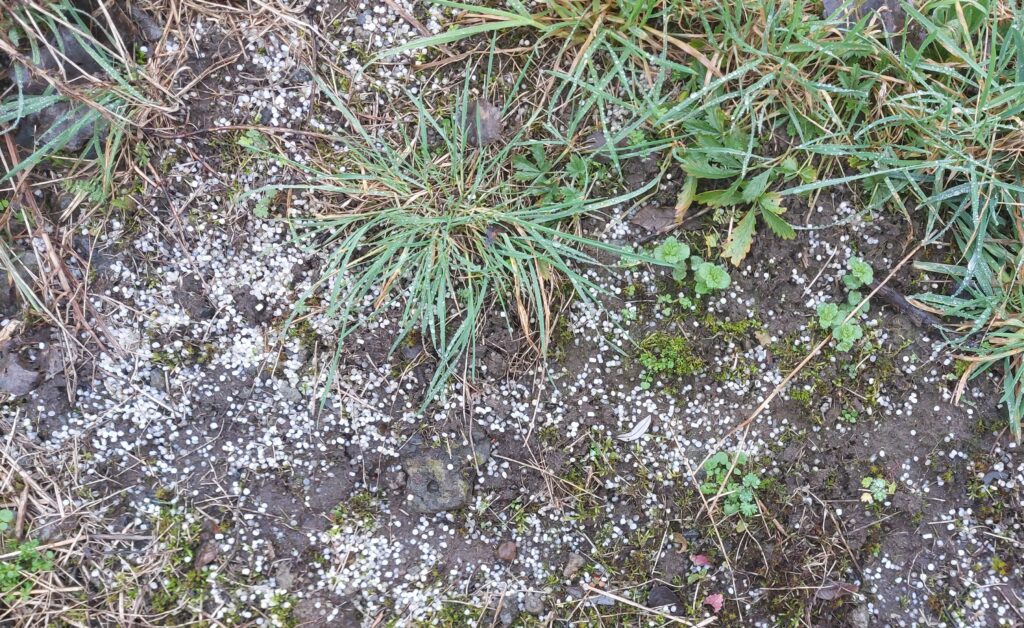Plastic production pellets: In Ecaussinnes, MEPs take a bitter look at chronic pollution
As the European Parliament’s Environment and Public Health Committee (ENVI) works on the plastic pellet loss regulation, Members of European Parliament (MEPs) went to see the scale and impact of the pollution for themselves. Invited by The Pew Charitable Trusts and Surfrider Foundation, with the help of Rethink Plastic alliance and Seas At Risk, they travelled just 30 kilometres from Brussels European Parliament to witness the disaster.
Plastic pellets, the plastic particles that are used to manufacture larger plastics, are a threat to the environment and public health. It is estimated that as many as 184,290 tonnes of pellets are lost in Europe1 every year. In January, north-west Spain made headlines as millions of plastic pellets flooded the coast of Galicia after a cargo ship lost a container of pellets in the Atlantic. Yet, pellet pollution is not only a coastal issue. Chronic pellet pollution also occurs on land, particularly in Europe, where large quantities of pellets are manufactured. The chemicals contained in plastics can be toxic to human and animal health.
To put an end to this pollution, the European Commission presented a legislative text aimed at regulating it in October 2023 and introducing minimum requirements for all pellet handling companies.
It was against this backdrop that, on 22 February, The Pew Charitable Trusts and Surfrider Foundation with the support of Rethink Plastic Alliance and Seas At Risk, both members of the Rethink Plastic alliance, invited MEPs to witness chronic pellet pollution firsthand around Feluy, the industrial zone home to petrochemical operations in the Ecaussinnes municipality, near Brussels.
MEP Saskia Bricmont, in particular, answered the call as well as MEP Caroline Roose’s team, MEP Peter Hansen and Ska Keller ones. Accompanied by the NGOs, they were able to meet Arnaud Guérard, alderman for the environment of Ecaussinnes, who explained:
“I’ve been following this pollution since 2020, after some citizens from Ecaussinnes complained about the discovery of pellets in their fields and in the Sennette river, 8kms away from the zoning” But according to him, “it seems like the pollution existed since the beginning, considering that Total Petrochemical began its exploitation in the middle of the 70s.” He explains : “this pollution is permanent and widespread.”
Saskia Bricmont, Member of the European Parliament, Group of the Greens
The MEPs discovered that the cultivated fields, the roads, the area around the complex and the Sennette river are completely overrun with these microplastics. After showing a first site in the zoning, Arnaud Guérard adds :
“Our first action was to alert firms about the pollution. The second one involved revising the authorizations granted by the town and Wallonian authorities to enhance preventive measures. However, at each stage, the companies challenged the proposed improvements to regulations.”
Arnaud Guérard, Alderman for the environment of Ecaussinnes
Indeed, even though the contaminated area is adjacent to the plastic pellet production site, it is important to remember that pellets are currently lost throughout the value chain, during production, transport, processing and storage, due to the lack of preventative measures. In addition to the loss of containers at sea, mishandling spills, road accidents and staff negligence combined with the washing of soil by rain and wind collectively contribute to the introduction of plastic pellets into the ocean.
“It is estimated that as many as 184,290 tonnes of plastic pellets are lost to the environment each year in the EU alone. That’s the equivalent of more than five kilograms being spilled every second. Once they are released, because of their tiny size, pellets are almost impossible to recover. However, unlike other sources of microplastics, pellet loss is preventable with appropriate policies in effect. We need urgent and binding action at an EU level as well as industry compliance to tackle the third-largest source of microplastic pollution in the EU,”
Natacha Tullis, officer, Preventing Ocean Plastics project at The Pew Charitable Trusts.

Regarding the need for a dedicated regulation, MEP Saskia Bricmont declares :
“It’s better to have a framework than no framework at all, but that’s the first step. The second is that the text is not ambitious enough, but that it needs to be seen as a whole; the directive on environmental crime also punishes this type of pollution: it enables local justice systems to take criminal action. There’s also work in progress on the directive on due diligence of companies and their subcontractors: it’s clear here that the problem concerns both a “parent” company, Total Petrochemicals, and the subcontractors it works with for logistics and transport: it’s the whole value chain that will have to comply with due diligence. All this legislation will have to work together.”
Saskia Bricmont, Member of the European Parliament, Group of the Greens
“Voluntary initiatives by companies are not enough. The companies concerned say : ‘Let us do our job, we have a social responsibility which means we have to be careful’. We have to admit that the pollution is there, that it persists, that there is no systematic cleaning, that there is no vigilance to ensure that the containers are watertight, that when the microplastic beads are transported by truck, they are not spilled. Solutions do exist, and these companies need to implement and finance them,” According to her, “It’s not a very visible problem, but we know that the oceans are polluted, but it’s not easy for people to make the connection: a microplastic bead that comes out of the Feluy zoning area can end up in the North Sea. The current problem remains the impunity of companies, who must prevent pollution and repair it if there is a problem” she concludes.
Saskia Bricmont, Member of the European Parliament, Group of the Greens
Civil society agrees that there is a real and urgent need for Parliament’s ENVI Committee to adopt this regulation.
“Two years after our first visit to Ecaussinnes, we can see that industries cannot be trusted to self-regulate and prevent plastic pellet pollution. The stakes are too high, and the consequences too dire to delay action any longer. The Regulation proposal demonstrates that this problem is not addressed properly by the plastic pellet value chain. Ambitious and harmonised EU regulation is needed. The text now has to be improved, especially by setting binding measures for all the firms involved in the pellet value chain, regardless of their size. In addition, addressing the loss of containers at sea is crucial, as the current legislation on maritime transport is really silent concerning this topic.”
Lucie Padovani, policy officer for Surfrider Foundation.
We remain at the journalist’s disposal for any other information.
About The Pew Charitable Trusts
Founded in 1948, The Pew Charitable Trusts uses data to make a difference. Pew addresses the challenges of a changing world by illuminating issues, creating common ground, and advancing ambitious projects that lead to tangible progress. For more information, please visit https://www.pewtrusts.org
About Surfrider Foundation Europe
The NGO Surfrider Foundation is a group of positive activists who take concrete action on the ground every day to pass on a preserved ocean to future generations. Our mission: to make the voice of the ocean heard loud and clear! Our weapons? Raising awareness and mobilizing citizens, children and adults alike (thanks to 48 volunteer branches throughout Europe), using our scientific expertise to lobby and transform companies. Find out more about the association at https://surfrider.eu/en or via this video
About Rethink Plastic Alliance
Rethink Plastic is an alliance of leading European NGOs, with thousands of active groups, supporters and citizens in every EU Member State. We bring together policy and technical expertise from a variety of relevant fields, and work with European policy-makers to design and deliver policy solutions for a future that is free from plastic pollution. We are part of the global Break Free From Plastic movement, made up of 11,000 organsations and individual supporters from across the world who are demanding massive reductions in single-use plastics and to push for lasting solutions to the plastic pollution crisis.
About Seas At Risk
Seas At Risk is an association of environmental organisations from across Europe, working together to ensure that life in our seas and oceans is abundant, diverse, climate resilient, and not threatened by human activities. Its mission is to promote ambitious policies for marine protection at European and international level. With over 30 members representing the majority of European countries, Seas At Risk speaks for millions of citizens that care deeply about the health and well-being of seas and oceans.
Contacts
- For The Pew Charitable Trusts
Nicola Manomaiudom | +44 7376 804 667 | [email protected] - For Surfrider Foundation Europe
Lionel Cheylus | +33 6 08 10 58 02 | [email protected] - For Rethink Plastic alliance
Caroline Will | +49 1590 1425817 | [email protected] - For Seas At Risk
Adenieke Lewis-Gibbs | +33 7 49 82 25 99 | [email protected]
Surfrider Foundation Europe’s “Break the Plastic Wave” campaign is supported by the LIFE programme created by the European Commission. The European Commission’s support for the production of this publication does not constitute an endorsement of the content, which reflects the views only of the authors, and the Commission cannot be held responsible for any use which may be made of the information contained therein.




